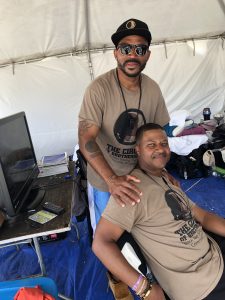NORTH MIAMI – On Tuesday, on a hunger strike for 18 days now, the nine men who call themselves the Hunger 9 want to get between “the gangs and the guns” affecting their communities in South Florida.
“I know that if we don’t do it, nobody is coming. There’s no cavalry coming,” says University of Florida graduate and family man Phillip Muhammad Tavernier. “We’ve tried so many different things. Nobody’s coming for us and the black man is missing in our community.” In this way, Tavernier, one of the Hunger 9, has chosen to fight the “tremendous apathy” he perceives regarding local gun violence.
The nine men belong to an organization of primarily black men, know as The Circle of Brotherhood, dedicated to “solving their own community problems.”
The Hunger 9 camp inside a set of tents in a corner lot at NW 62nd Street and 12th Avenue in Liberty City, where the 1980 Miami riots took place after the acquittal of four white Dade County police officers in the death of Arthur McDuffie, a black insurance salesman and former Marine.
Drinking only water, a paramedic comes to check on the men’s health each day. People in the community, including local politicians, have visited and expressed their support
Seven or eight years ago, Tavernier remembers he gave his eleven-year-old son, an engraved small knife after learning from a TED Talk about “dangerous things you should let your kids do.” Then, his daughter told him that his son had begun to take the knife everywhere. “I asked him: Why do you carry a knife everywhere you go?” “He said, without skipping a beat: ‘for protection.’”

Brotherhood entertainment committee Anthony Blackman (top left), Brother Phillip Muhammad Tavernier (bottom right). Photo by Rachel Chang
Raising a family in Miami Gardens, the third largest city in Miami-Dade county and home of the Hard Rock Stadium and the Miami Dolphins, Tavernier started to notice more and more gunshots. Something has to be done, he decided:
“You can literally just go in the community and break up fights, you can do that,” Tavernier said. “That’s one way, but then when the idea came to us, I was like, ‘so we’re going to do this to end gun violence?’—this is one way that I can get in between the gangs and the guns.”
Tavernier sees his hunger strike as an effort to spark a dialog about the killings in the community, a personal responsibility and obligation.
“These are small things compared to the fact that I really believe that somebody is going to put down the gun,” Tavernier said. “So, I know that out here, we got to just discipline ourselves—So shut up stomach, I got this.”
































